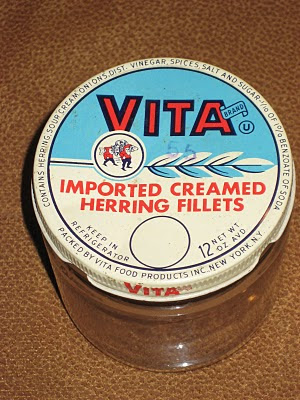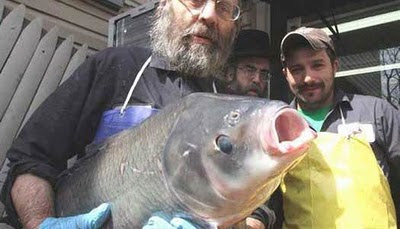
A Tour Through the History of America’s Ethnic Cuisine
By Joel Denker
May 29, 2008
From Chapter 4: “The Heartburn of Nostalgia: Jewish Food in America”
Herring and smoked fish, those passions of the Jewish immigrant, would also find their way onto the supermarket counter and into the American kitchen. Two young Czech Jews, Victor and George Heller, who arrived in New York City in the early 1900s, were savvy merchandisers on this culinary frontier. These German-speaking immigrants found jobs in a delicatessen in Yorkville, a German section of the city.
Herring, a fish they loved from their childhood, was one of the shop’s biggest sellers. It appealed to Jewish shoppers as well as to Poles, Germans, and other European immigrants. “In the old country, it was a staple food for them,” Aaron Gilman, Victor Heller’s son-in-law, observed. After gaining several years of retail experience, the two brothers opened their own delicatessen in 1915 and soon thereafter launched two more.
Herring was selling so briskly in their stores that the brothers decided to go into the packing business. Initially, they imported herring and put it up in kegs, baskets, and barrels in a building on Hudson Street in lower Manhattan. They divided up the responsibilities: George handled the packing side; Victor lined up customers.
They marketed an “institutional pack” to restaurants, delicatessens, and mom-and-pop stores. In fact, in the early days, they sold their product to “anyone who would buy it,” Mr. Gilman who became an executive with the business, commented. After trying cardboard containers, the Hellers began packing their herring in jars, their most radical marketing breakthrough. Before that shoppers “would pick them out of a barrel and wrap them in a newspaper,” Mr. Gilman noted.
World War I slowed the herring business. Victor went into the army, and the business’s imports from Europe stopped. George improvised by organizing a domestic herring fleet that sailed from Provincetown. Business rebounded in the 1920s, and the Hellers expanded into smoked fish, another popular ethnic item. They acquired an old-time smoking business, the Richard Schnibbe Company, and started processing salmon, whitefish, and sturgeon in its Brooklyn plant. Constantly looking for new product lines, the brothers added olives and caviar to their list.
In 1930 the Hellers formed the Vita Food Products Company, which merged their enterprise with a number of smaller operations they had purchased. Vita became their products’ brand name as well; the name came from the bulk item they had been buying from the F. H. Phillips Company, a business in Lovenstoft, England, near the Scottish border. Vita, which meant “health” in Latin, also, they felt, had a nice ring to it.
The enterprise was still a modest one, however, and it was not until the 1950s and 1960s that sales rose. Vita, which grew into a $40-to-$50-million-a-year business, no longer had to depend on the small retailer. The supermarkets, which emerged as a marketing force after the war, bought an ever-growing share of its products. The Hellers diversified, expanding into maraschino cherries, sweet and sour pickles, mushrooms, and red and green peppers. The company also acquired more businesses, bought fishing boats, and built modern plants, canneries, and smokehouses.
But herring was still the foundation of their company. Starting with bismarck, the small whole fish, Vita introduced herring fillets and then herring tidbits. After the war, the Hellers brought out their best-known product, herring in cream sauce. Vita herring was “one of the first convenience foods that people could buy,” Aaron Gilman says. “They could take it home and consume it with a piece of black bread.”
Advertising broadened the appeal of the product. An endearing character, the herring maven, began appearing in ads in the 1960s promoting the brand. “Get Vita at your favorite supermarket, grocery, or delicatessen. Tell them the beloved Maven sent you. It won’t save you any money, but you’ll get the best herring,” a 1965 advertisement in the Hadassahnewsletter told readers.
Vita moved from the ethnic press to the general media, to newspapers and television. One of their newspaper ads for herring tidbits showed an empty jar. The caption read, “Herring Maven Strikes Again.” Maven, a Yiddish word, which came from the Hebrew for “understanding,” was at that time not widely known outside of Jewish circles. In a clever strategy, Vita employed an ethnic expression for “expert” to give their herring cachet.
Antique VITA herring jar a gift from the Roller Family of Flatbush--THANKS!!!!!




